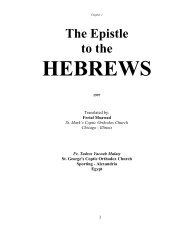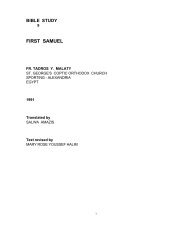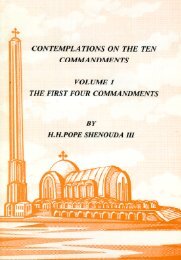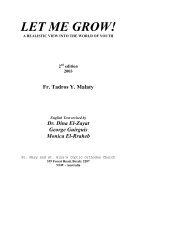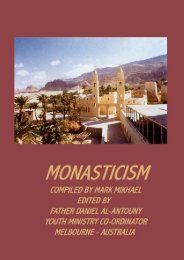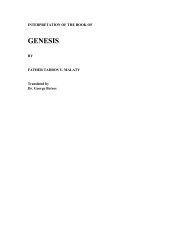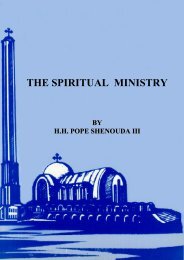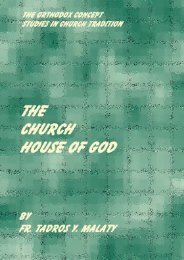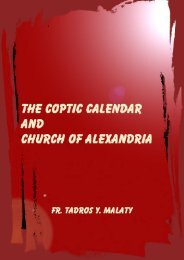How to Benefit from the Holy Liturgy - Pope Kirillos Scientific Family
How to Benefit from the Holy Liturgy - Pope Kirillos Scientific Family
How to Benefit from the Holy Liturgy - Pope Kirillos Scientific Family
- No tags were found...
You also want an ePaper? Increase the reach of your titles
YUMPU automatically turns print PDFs into web optimized ePapers that Google loves.
light of your saints." He <strong>the</strong>n places one spoonful of incense<br />
in<strong>to</strong> <strong>the</strong> censer presented <strong>to</strong> him by <strong>the</strong> deacon, and he <strong>the</strong>n<br />
mentions o<strong>the</strong>rs who have departed.<br />
Once <strong>the</strong> deacon has responded, "Let <strong>the</strong> readers name our<br />
holy fa<strong>the</strong>rs who have departed...", <strong>the</strong> priest would have<br />
completed <strong>the</strong> recitation of <strong>the</strong> Diptych inaudibly, <strong>the</strong>n <strong>the</strong><br />
congregation respond, "Glory be <strong>to</strong> You O Lord, Lord have<br />
mercy, Lord have mercy, Lord bless us, Lord repose <strong>the</strong>m,<br />
Amen."<br />
This is a specific response for <strong>the</strong> Diptych of <strong>the</strong> departed<br />
and not for <strong>the</strong> Synaxis as some understand. Due <strong>to</strong> <strong>the</strong><br />
misunderstanding that this is a response for <strong>the</strong> Synaxis of<br />
Saints, some have added, "May <strong>the</strong>ir holy blessings be with<br />
us all, Amen," <strong>to</strong> <strong>the</strong> beginning of <strong>the</strong> response. This<br />
sentence was not originally present in <strong>the</strong> old liturgy books,<br />
nei<strong>the</strong>r in print or in scrolls. The liturgy of <strong>the</strong> society of <strong>the</strong><br />
church's children mentioned it between brackets <strong>to</strong> denote<br />
that it is not original, but ra<strong>the</strong>r, recently added. Logically<br />
though, it is not possible for this response <strong>to</strong> refer <strong>to</strong> <strong>the</strong><br />
Synaxis of <strong>the</strong> Saints, ("Lord repose <strong>the</strong>m Amen"), for <strong>the</strong>y<br />
have reached <strong>the</strong> highest levels of repose, comfort and<br />
happiness in <strong>the</strong> paradise of joy and <strong>the</strong>ir names are placed in<br />
<strong>the</strong> Synaxis so that we may ask for <strong>the</strong>ir intercessions.<br />
If this response is meant for <strong>the</strong> recently departed <strong>the</strong>n we<br />
should not say, "May <strong>the</strong>ir holy blessings be with us all<br />
Amen," because we do not know <strong>the</strong>ir fate and <strong>the</strong> church<br />
has not confessed <strong>the</strong>ir holiness. It is not logical <strong>to</strong> ask for<br />
<strong>the</strong>ir repose and <strong>the</strong>n <strong>to</strong> ask for <strong>the</strong>ir blessings. This response<br />
is meant for <strong>the</strong> recently departed, and not for <strong>the</strong> saints, as it<br />
is said after <strong>the</strong> Diptych and not <strong>the</strong> Synaxis. Ano<strong>the</strong>r proof<br />
162




